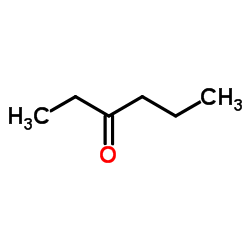3-Hexanone

3-Hexanone structure
|
Common Name | 3-Hexanone | ||
|---|---|---|---|---|
| CAS Number | 589-38-8 | Molecular Weight | 100.159 | |
| Density | 0.8±0.1 g/cm3 | Boiling Point | 125.5±3.0 °C at 760 mmHg | |
| Molecular Formula | C6H12O | Melting Point | -55°C | |
| MSDS | Chinese USA | Flash Point | 35.0±0.0 °C | |
| Symbol |


GHS02, GHS07 |
Signal Word | Warning | |
|
Evaluation of injection methods for fast, high peak capacity separations with low thermal mass gas chromatography.
J. Chromatogr. A. 1392 , 82-90, (2015) Low thermal mass gas chromatography (LTM-GC) was evaluated for rapid, high peak capacity separations with three injection methods: liquid, headspace solid phase micro-extraction (HS-SPME), and direct vapor. An Agilent LTM equipped with a short microbore capil... |
|
|
Solid phase microextraction, mass spectrometry and metabolomic approaches for detection of potential urinary cancer biomarkers--a powerful strategy for breast cancer diagnosis.
Talanta 89 , 360-8, (2012) A sensitive assay to identify volatile organic metabolites (VOMs) as biomarkers that can accurately diagnose the onset of breast cancer using non-invasively collected clinical specimens is ideal for early detection. Therefore the aim of this study was to esta... |
|
|
Tetranychus urticae-triggered responses promote genotype-dependent conspecific repellence or attractiveness in citrus.
New Phytol. 207 , 790-804, (2015) The citrus rootstocks sour orange and Cleopatra mandarin display differential resistance against Tetranychus urticae. Sour orange plants support reduced oviposition, growth rates and damage compared with Cleopatra mandarin plants. Jasmonic acid signalling and... |
|
|
Profile of volatile metabolites in human urine.
Clin. Chem. 17(7) , 592-4, (1971)
|
|
|
Mammal pollinators lured by the scent of a parasitic plant.
Proc. Biol. Sci. 278(1716) , 2303-10, (2011) To communicate with animals, plants use signals that are distinct from their surroundings. Animals generally learn to use these signals through associative conditioning; however, signals are most effective when they elicit innate behavioural responses. Many p... |
|
|
Differentiation of isobaric compounds using chemical ionization reaction mass spectrometry.
Rapid Commun. Mass Spectrom. 19(22) , 3356-62, (2005) The technique of proton transfer reaction mass spectrometry (PTR-MS) couples a proton transfer reagent, usually H3O+, with a drift tube and mass spectrometer to determine concentrations of volatile organic compounds. Here we describe a first attempt to use ch... |
|
|
Determination of Henry's law coefficients by combination of the equilibrium partitioning in closed systems and solid-phase microextraction techniques. Dewulf J, et al.
J. Chromatogr. A. 830(2) , 353-363, (1999)
|
|
|
Antibotulinal properties of selected aromatic and aliphatic ketones. Bowles BL and Miller AJ.
J. Food Prot. 56(9) , 795-800, (1993)
|